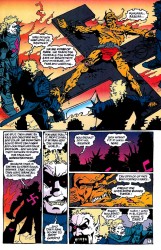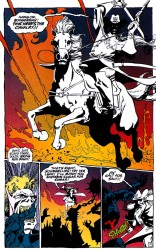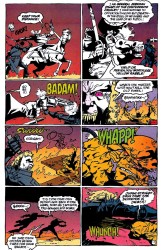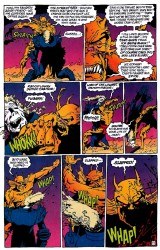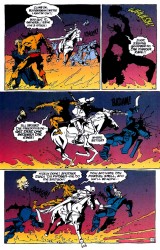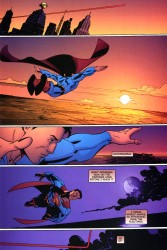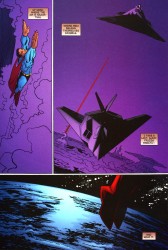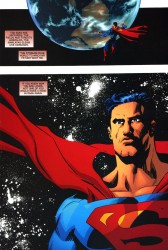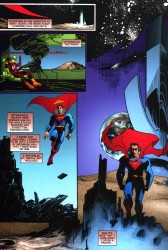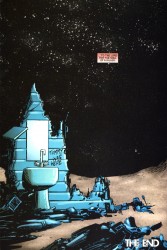


Frank Castle and the Marvel Universe
November 25th, 2009 Posted by GavokSolo #7 was originally supposed to have a cover by Mike Allred that depicted the 1960’s Adam West incarnation of Batman dancing the Batusi. It was replaced with Wonder Girl doing the same pose. One of the rumors as to why it was scrapped was that Dan Didio wants to put the kibosh on emphasizing the West-style Batman due to beliefs that West’s portrayal ruined the character for many decades up until Dark Knight Returns returned him to form. You get the idea: you can’t take a man dressed as a bat with underwear over his pants seriously if you’re reminded of that show where Cesar Romero painted over his mustache.
Is it true? Probably not. Batman: The Brave and the Bold is very Dick Sprang Batman and Sprang’s take on the Caped Crusader is practically brothers with Adam West Batman. Then again, I’m not sure if Didio had any real say in that.
But the precedent is there. There are fans out there who seem so stuck in their ways that to even portray their beloved character in a different tone offends them. That’s the case with the current Rick Remender Punisher storyline, Franken-Castle.
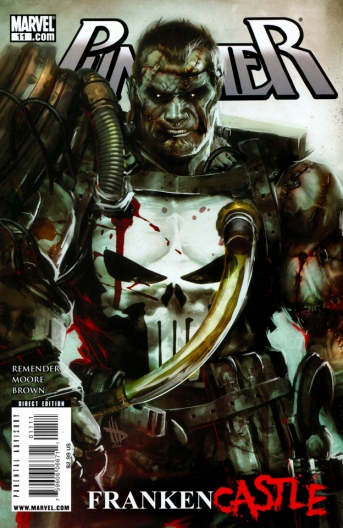
People HATE this image and all it represents. If you’re seeing this for the first time, chances are you might be thinking, “What the hell is this shit?!”
It’s awesome, that’s what it is.

“Their capacity for evil so evident and prevalent”
November 5th, 2009 Posted by david brothersI wanted to revisit and expand on the “HEROES DON’T KILL” post from yesterday, since it prompted some conversation.
My biggest problem with HEROES DON’T KILL as a hard-line rule is that it stems from the days when comics were meant for children and suffered under the tyranny of the Comics Code. Heroes must be pure and heroic at all times, and killing was right out. For children, that’s fine. Simple morality tales are an easy way to introduce the social contract. What’s racism? Racism is bad. What’s war? War is bad. And so on.
The problem is that comics grew up with their audience, and writers started stretching the limits of believability in an attempt to appear grown up. Every time a villain broke out of jail, he’d have to do something worse to top the previous story. Joker evolves from the Clown Prince of Crime to the Thin White Duke of Death, and every breakout spreads death and decay by the dozen. Norman Osborn goes from a guy who killed a girl once and wanted to run the underworld into a scheming plotter capable of faking several deaths, ruining even more lives, and torturing whoever he likes.
At a certain point, in the quest to give heroes something to fight against, the creators of these comics have made the heroes look like failures. Batman: Arkham Asylum, the recent video game, is an excellent example. No matter what he does, or who he rescues, nothing he does matters. You can idly rescue a couple of asylum patients and workers in the game, but when you re-enter that area, whoops, look at that, they’re dead. Sometimes you get there in time to see an inmate beating their brains in, but it’s too late to save them. It makes Batman look inept, like all he can do is stand there in his long johns trying to hold back an unstoppable tide of pure evil.
It’s not any better in the comics. Villains break out of jail, murder a few people, go after the hero, and then go back to jail. Eighteen of our months later (if we’re lucky, and we usually aren’t) and they do it again. And again. And again. The body count rises, the hero thinks about all the lives that have been lost and feels bad about it, and then does the exact same thing again. Lather, rinse the blood off your hands, and repeat.
What’s even worse is the sliding scale of acceptable killing. Sentient beings from computer monsters to aliens? Murder at will. However, a guy who has, over the course of maybe six months at most, shot down an airplane full of civilians to see if a hero would catch it, ordered the death of several American citizens, hired mass murderers and villains under false pretenses, engaged in military actions in foreign lands, and placed scads of people who are loyal only to him in various sensitive places in the federal government? That guy is strictly off-limits.
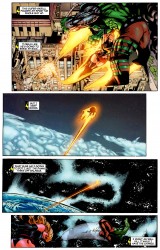
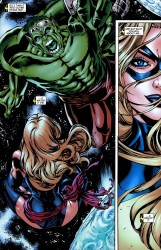
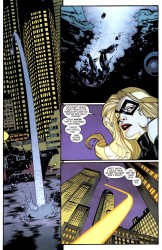
See? Ms. Marvel is three things here. Creepy, smug, and a hypocrite. Why is it okay to kill aliens and not humans? Is that where “Thou shalt not kill” stops? “You weren’t born in Peoria, you’re fair game?”
It’s the hypocrisy that bugs me more than anything. When Hawkeye says that the Avengers should kill a man who has killed Spider-Man’s girlfriend, kidnapped his child, ruined the life of a good friend, created a vicious cycle of hate that infected Peter’s best friend Harry and his son, faked Aunt May’s death, and tortured Spider-Man for days… Spider-Man’s reaction, realistically, shouldn’t be to whine about how heroes don’t kill ever ever ever no matter what.
I’m not saying that all heroes should be bang bang shootem up all the time. That’s stupid. There are several perfectly good reasons not to kill someone, and killing would ruin the charm of certain characters. I don’t think Superman should ever kill anyone. Spider-Man, as the ultimate street level everyman hero, probably shouldn’t kill anyone, either.
(though back when i cared about that sort of thing, i realized that the one instance where spidey would kill would be if and when norman snaps, kidnaps MJ, or maybe Baby May, and it’s his last choice. he’d do it, and he wouldn’t feel good about it, but he wouldn’t regret it, either.)
But, to pretend that heroes should never kill, while their enemies continually up the ante and stack atrocity on top of atrocity and shoot past irredeemable and on into genocidal… you start to notice the guy behind the curtain. That’s when you realize just how the sausage is made and start caring less and less. Black Adam has millions of deaths on his resume. Vandal Savage destroyed Montevideo. Deathstroke’s blown up Bludhaven, and, along with Cheshire, nuked the capital of Qurac. Mongul destroyed Coast City.
At some point, you have to weigh your peace of mind and so-called moral high ground against thousands upon thousands of lost lives. And sometimes… it’s worth the sacrifice.
And that’s why the hard-line HEROES DON’T KILL is childish to me. It’s applying a black and white morality to a situation that doesn’t fit it any more. Back when Spider-Man was created, Doc Ock was killing people mainly by accident. Green Goblin just wanted to run the mob. Now? Now villains completely undercut the hero by simply existing, and every time we get one of the “I’m better than you, I don’t kill” scenes, or the scenes where the hero fights hard to save a villain’s life so that he can sleep soundly at night… well, I roll my eyes.
All I want is to see some nuance and maturity when taking on the idea of heroes killing, rather than heroes with barely a leg to stand on preaching directly at me. It’s not clever, it’s not smart, and we’re not children. Garth Ennis got it with his portrayal of the Punisher. It’s not even hard or really very complicated. Sometimes, the hard choice, the bad choice, the unreasonable choice, is the best possible choice to make. Sometimes you have to do bad to do good.

Garth Ennis may hate superheroes…
November 3rd, 2009 Posted by david brothers
“Don’t be forgettin’ the Free French.”
October 16th, 2009 Posted by david brothersBlogging’s going to be light today since work and other things have occupied my time lately, but I did want to share this sequence from (the as-yet uncollected) The Boys #34. Garth Ennis and Carlos Ezquerra came up with a pretty good (and brutal) way to use World War II in a superhero book. I usually like my World War II pure, but this? This is clever. I snipped a few pages out, but this is still followable. And if you can’t tell by the cover, you probably shouldn’t be clicking this at work.










Dynamite needs to drop this trade asap.

The Boys 35 Preview
October 5th, 2009 Posted by david brothers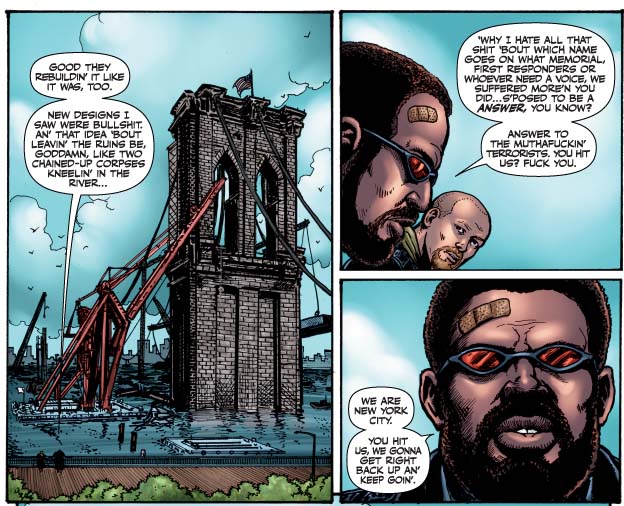
The Boys is a good series that’s been getting better as it gets closer to its endpoint. While the occasional individual issue may not always be up to par, the arcs have been good stuff.
There was a sequence early in The Boys that’s stuck with me. Two pages from The Boys Vol. 2: Get Some:
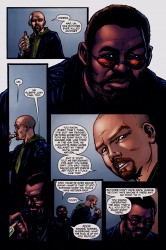
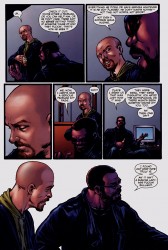
His line about hate not being “lazy-ass fuckin’ bullshit” is something that betrays a deeper story, and it looks like we’re getting it with the new arc of The Boys. CBR has a nsfw preview of The Boys #35, with this text:
Origins time. In the first of the two part “Nothing Like It In The World”, Mother’s Milk tells Hughie the story of his life to date- his upbringing in Harlem, the secret of his massive strength, the catastrophe that struck his family, and the unforgettable boxing championship disaster that led him to join The Boys.
His name is apt. I’ll just leave it at that.

Physics Phail
August 13th, 2009 Posted by Esther Inglis-ArkellFine, I know, spelling fail, too. Still.
In comics there are a lot of situations in which characters of wildly different sizes fight. Lilliputian characters will go up against regular-sized people, or normal people will fight fee-fie-foe-fum-style giants. Sometimes, not always, but sometimes these fights will contain knock-out punches delivered by the smaller character.
Imagine a fist smashing into your face, hard enough to knock you out.
Now imagine a something the size of a pen cap smash into your face at the same speed as a punch. Now imagine a pen-tip. A needle tip.
Yes, it would depend on the thickness of the relative giant’s skin, and the amount of momentum behind the punch. But if you see Wonder Woman punch Giganta, Giganta shouldn’t fall down, she should be stabbed through the cheek.
I would think this would appeal to some of the gore-loving creators. Think of a super-speed-powered character punching a giant foe again and again, ripping holes into the skin, the hero’s arms dripping with capillary fragments and subcutaneous fat, until the giant character was just one walking blood-fountain. Very Ennis, no? Or do I mean Ellis?
Well, I imagine they’d both like it.

The Punisher: …and those for whom there are no words
August 12th, 2009 Posted by david brothersIn the end, Garth Ennis’s Punisher was about both the best and the worst of humanity. The worst, in that he represents just how thoroughly a human being can be broken by the unthinking and inhuman actions of others. The best, in that he looks at the terrible things that the best of us tolerate and says, “No more.”
Ennis’s Punisher isn’t a hero. He may do heroic things, and he may save lives, but he’s no hero. He is, at best, a murderer whose goals happen to coincide with those of many members of society. Punisher MAX really works for two reasons. Ennis treats the series as a war comic, making sure to show the effects of the violence on society and the characters. He writes Frank Castle not as the Punisher, a costumed mental case with a mad-on for criminals, but as a soldier using the things he learned in Vietnam to put the screws to the people he hates.
Frank Castle is no one to look up to, but he exists as the ultimate “If I could…” character. A social worker partway through the series, in the phenomenal The Slavers arc, gives Castle information on his targets, against her better judgment, because she wanted them to pay for what they’d done. She knew the law would never be able to touch them and that they would skate through life, and she hated them for it. They were trash, less than human, and the only person who could do what needed to be done was a man wiling to be inhuman to them right back.
And he does so, if not admirably, then with a certain amount of skill. He makes a child of a hard man with ease, before he finds the woman who helped mastermind the entire scheme. When she begs for her life, explaining that they just wanted to be in America and do business, he coldly tells her, “All that counts is you can’t stop me. I’m stronger than you, so I can do anything I want.” There’s a beat, as time passes and the panel switches, and he asks her, “Isn’t that the way it works?”
And it’s wrong, he’s beating this woman to death, and it’s terrible… but she’s the one who came up with the “rape them to break them” plan. She was willing to use other people as cattle to make sure that she lived a life of luxury. You’re appalled, and it’s ugly, but deep down, you understand that she’s getting exactly what she deserves. Getting to be a monster with no repercussions is unthinkable. It makes for some uneasy feelings. So, you don’t cheer, exactly, but there’s a quiet understanding, the feeling you get when you squash a bug that might have, or did, sting you. It is ugly, but it needed to be done. It is not a good thing that it was done, exactly, but it was necessary.
Frank Castle is a monster, but he’s also a representative of our gut instinct when confronted with some fresh horror. He does what a lot of wish we could, or, failing that, wish would happen, but make no mistake: he is only better than those he kills by comparison. He is a monster, and when confronted with this fact, he agrees. He cannot bring anyone into his life, because at some point, no matter how happy his life is, he is going to turn on the news and see someone that must be punished. He’s damned, he knows it, and he accepts that it is what it is.
The thing about Frank Castle, the thing that keeps him from becoming a generic and bloodthirsty action hero, is that he takes no joy in what he does. One-liners are rare, and stand out when they do occur. It is clear to both the reader and to Frank Castle himself that he takes no pleasure in what he does. The closest he comes is satisfaction, and even that is a vague inference. He does it because it must be done, and he does it because no one else will.
When confronted with the death of a broken and sad woman, all he thinks is, “If I could, I’d kill every single one of them. I’d wipe them out. And you’d never have had to exist at all.” It isn’t an honorable sentiment, but it is a sad one. Whenever Frank Castle meets a normal person, someone not in his line of work, he’s met with shock, scorn, and horror. They understand his appeal, and a couple characters even take him up on it, but his way is not the way life should go. There is no honor, no glory in being Frank Castle.
Garth Ennis took a derivative character, a Dirty Harry for superheroes, a character used to reiterate the ridiculous idea that heroes should never kill, and used him as a mirror for us. Our fears and our insecurities were put on display and put down over the course of the past five years.
Frank Castle didn’t die at the end of Ennis’s run on the Punisher, but I’ve read all the Punisher stories I need. I can’t read the one that fights supervillains, gets up by superheroes because he’s a loose cannon, and never seems to accomplish anything. I can’t take him seriously. It’s like going from photorealism back to stick figures, from the modern age back to the Silver Age, or aging backwards. I’ve read a Frank Castle that brought feelings and thoughts that I’d left unexamined right to the forefront of my mind. I watched him murder people, people who absolutely deserved it, and felt that that was the only way their story could have, and should have, ended. I’ve had to examine my reactions to his actions, and figure out what that means about me as a human being. And, honestly, I’m better for it.
After The Slavers, Punisher vs Kingpin is hollow. I’ve seen real villains in these pages, and that comic book nonsense is just that. The Punisher shouldn’t be a character that makes you pump your fist and go “YEAH!” At this point, that’s a take on the character I want nothing to do with. It’s boring and retrograde.
Those five hardcovers on my shelf, though? Those are five of the finest, and most thoughtful, books Marvel ever put out. It’s a poorer comics world without them. All five volumes are on Amazon. Five, Four
, Three
, Two
, One
. The hardcovers collect two stories a piece, and are by far the best way to read the series. These are comics to get angry to and comics to care about. These are comics to think about.

Dear Billy, Is This All I Get?
June 23rd, 2009 Posted by david brothersDue to reviewing the Lone Wolf & Cub books once a week, I’ve spent a lot of time over the past couple of months thinking about justice and revenge. The reasoning behind revenge, the stresses it puts on someone, the sacrifices necessary to pursue revenge, and even, occasionally, my own personal feelings about it. It’s a little draining, to be honest, but fascinating at the same time.
Garth Ennis and Peter Snejberg’s Battlefields: Dear Billy, published by Dynamite Entertainment, takes the idea of justice and revenge head-on, but not exactly in the way I expected. Most creators, when writing a story about revenge, tends to take the obvious route. Something horrible happens, usually in graphic detail, someone makes a promise, and then a whole lot of people die. You’ve seen it with Ultimate Hawkeye, whose entire family was murdered. Ogami Itto is stacking the bodies up like cordwood. Daredevil’s gone on multiple revenge quests. Omar from The Wire spent the bulk of the fifth season of the show killing men who wronged him.
Ennis and Snejberg present an entirely different scenario. During World War II, on the way to Java, Carrie Sutton, and several other British women, were captured, raped, machineguned, and left for the dead by Japanese soldiers. Carrie was the only survivor.
After her convalescence, Carrie is discharged and becomes a nurse for the British in the Eastern Theater. She meets a man, the Billy of the title, and they fall in love. Their romance allows both of them to escape from the war, both mentally and physically, as they were both brutalized by the Japanese. Billy had been caught after landing his plane, and was bayonetted, though Carrie pretends not to know that. She keeps Billy in the dark about her past, as well. Billy likes the idea of portraying the war as no big deal to his little lady, and she enjoys indulging him in that fantasy. However, it isn’t enough. When a Japanese prisoner of war is brought into Carrie’s hospital, she smothers him with a pillow.
Carrie and Billy’s relationship disintegrates when he says the wrong thing to her. After a night out drinking with friends, they get into an argument about what’s going to happen after the war. Carrie asks, “If the Japs are to be groomed as allies, what the hell are we supposed to do about them?” Billy replies, “Now we learn to love them, Carrie.” And Carrie cannot take that, and so their relationship, and the book, ends.
Carrie went through a harrowing experience and had no outlet for those emotions. There was no way she could actually have justice or closure for her suffering. There would be no trial, no execution, no recompense. So, she killed men. It didn’t make her feel better, but it did do something to make her feel less bad, if only for a moment. The thought of learning to love the people that had traumatized her was too much.
I think the fundamental question at the heart of this book is “What is forgivable?” Being raped and near-murdered left a hole in her heart, and it was an injury that she never truly recovered from, despite finding solace in Billy’s arms. The only thing she wants out of the Japanese, the only thing that makes sense to her, is revenge. After they’ve surrendered, she feels that the British and American should twist the knife and “make them pay.”
Obviously, Carrie murdering the defenseless men is a crime. It’s an act of evil. At the same time, I feel like I understand where she’s coming from. After being hurt, the only thing you want, the only thing you dream of, is hurting someone back. That’s where messy break-ups, painful divorces, alienations, and falling outs come from. It’s the “get-back.”
So while reading, I condemned Carrie with the rational side of my brain and empathized with the other side. It forced me to look at myself and try to figure out how I would react if put into a situation where revenge was easy. And I found that I don’t have an answer. Carrie’s actions are inexcusable, but she was hit very hard by the war. Where Billy could be content with victory, she could not. No act could ever salve her wounds. I’m not saying it’s right, but I understand.
Ennis throws the idea of suffering in silence, British valor, and stiff upper lips directly under the bus. Carrie never gets to discuss her ordeal with anyone, choosing instead to keep it in herself, and it festers and rots inside her. Billy can talk about his injuries with other military men and gain some semblance of comfort, because that’s what men get to do. This may be the key difference between Carrie and Billy’s approach to the war. Carrie is forced to keep it inside, while Billy gets at least a moment to air it out.
Dear Billy is one of my favorite Ennis works, in part because of the ambiguity it spawned in my thoughts. There are no easy answers to be found here. No comforting condemnation of any act. Ennis leaves it up to the reader to decide the morality of Carrie’s actions, and how that applies to us as human beings. This is definitely one of the most melancholy things that he’s written.
Battlefields: Dear Billy is part of a three part cycle. Night Witches
and The Tankies
round out the trilogy, which will be collected into a Battlefields
hardcover later this year for thirty bucks. I’m not sure why Amazon lists Dear Billy as not released, as my own copy and Dynamite’s site suggests otherwise. It’s cheap, just thirteen bucks, and worth your time.

Black History Month ’09 #12: Banned For Life (Spit the Real)
February 12th, 2009 Posted by david brothers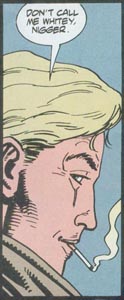
Yeah, that’s Vertigo’s longest running main character John Constantine getting his Kramer on right there.
I thought about getting tricksy and putting the rest of this entry behind a cut to get your interest and see what’s up with John C getting all British National Party on us, but I’ll just go ahead and say that there’s a plot twist toward the end of this post. Oops, spoilers!
I’ve talked about context before, but I want to revisit it with a slightly less flippant tone this time around. Do read that post, however, as I think it makes a very good point about lists of items with no discussion or commentary.
Tropic Thunder was one of my favorite movies last year, if not my absolute favorite. It was definitely the movie I saw the most, with three times in the theater and a few more times once the Blu-ray dropped. Part of it was that I cried the first three times I saw it from laughing so hard. The other part was that it was one of those features that butts right up against race and doesn’t back down, resulting in something brave and interesting.
The surface value reading of Tropic Thunder, the kiddy pool reading, is that it’s a movie that features blackface, an ignorant and offensive portrayal of a black person by a white person. It was used to keep black people from roles in motion pictures.
The problem is that, in the context of the movie, that isn’t what Tropic Thunder is about at all. Instead, it’s about the amazing self-centeredness of actors, a self-centeredness that allows an Australian actor to think that it’s a good idea to dye his skin and pretend to be what he thinks a ’60s era black man was like.
Brandon Jackson, who plays rapper Alpa Chino, comes into major conflict with Robert Downey Jr’s character throughout the movie. He calls him out regularly, even going so far as to say that there was one good role in the movie for a black man, and “they gave it to Crocodile Dundee.” It sets up an interesting and surprisingly deft commentary on race, actors, and Hollywood. Race is treated as a commodity, something to be bought and sold.
RDJ’s authentic impression of a man doing an inauthentic impression of a black guy probably hits its peak when he goes off about how he’s going to collar up some greens, y’all, you realize that he’s working from a stereotype and just didn’t bother to actually see what real black people are like.
John Ridley says this in response to a columnist suggesting that there is no situation in which a blackface performance is at all acceptable:
Really? Can’t imagine any circumstance to use the word Nigger? You mean, like in a Ralph Ellison novel?
Trustees of the Liberal Plantation aside, Downey Jr.’s performance is sharp, smart satire. Clever, but aimed squarely for the gut, in the way the New Yorker’s Barack/Michelle-as-radicals cover was aimed at some other Brahmin organ that giggles with delight when it’s self-manipulated.
Nothing’s taboo. I don’t know that there’s a single subject out there which isn’t worthy of examination. Some comics have dealt with rape in terrible ways. Others, like The Slavers, leaves you feeling angry and pessimistic because it’s real. Same with racism, sexism, or anything else. The only barometer for what’s appropriate or not is the level of quality. If it works, it’s fine. If it didn’t work? Try again, kid.
This brings me right back around to comics. When is it appropriate for John Constantine to say nigger?


When he’s speaking to a friend he has history with, both of whom have just been through hell in a very literal sense of the word.
Context.

